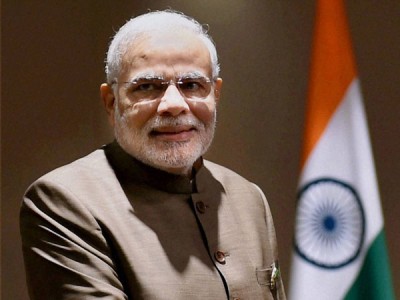Modi Expected to Continue Peace Mission with Visit to Kiev on Its National Day

Only weeks after Ukrainian President Volodymyr Zelensky blasted the meeting between the leaders of India and Russia as a “huge disappointment,” Indian Prime Minister Narendra Modi is preparing for an official trip to Kiev in the third week of August. India is embarking on a peace mission akin to Chinese and Hungarian efforts, despite Zelensky condescendingly and incorrectly claiming that Modi’s meeting with Russian President Vladimir Putin was a “devastating blow to peace efforts.”
The visit follows on from Modi’s recent trip to Russia and highlights New Delhi’s balanced foreign policy approach. Moscow respects this approach and does not condemn the Indian leader’s expected meeting with Zelensky, unlike Kiev and Washington, which expressed frustration and disappointment because Modi met with Putin.
Even weeks after Modi met with Putin, Washington was evidently still angered by the meeting.
US Assistant Secretary of State for South and Central Asian Affairs, Donald Lu, on July 24 told the US House Foreign Affairs Committee that the US government had shared its “disappointment” about the “symbolism and timing” of Modi’s trip to Moscow and had “tough conversations” with “our Indian friends,” whilst House Representative Joe Wilson, who serves as a senior member of the House Foreign Affairs Committee, remarked:
“It is shameful for India to continue supporting war criminal Putin in his mass slaughter of Ukrainians.”
However, India is an independent country that continues its long-held policy of non-alignment and will not be intimidated by Washington into not deepening its bilateral ties with Russia. At the same time, as part of balancing diplomacy, New Delhi pursuing closer relations with Kiev will not hinder its ties with Moscow.
It is recalled that only on July 12, days after Modi met with Putin, US Ambassador to India Eric Garcetti said,
“I respect that India likes its strategic autonomy, but in times of conflict, there is no such thing as strategic autonomy. No war is distant anymore. And we must not just stand for peace, we must take concrete actions to make sure those who don’t play by peaceful rules, that their war machines cannot continue unabated. That’s something that the United States needs to know, and that India needs to know, together.”
At the time, India’s External Affairs Ministry spokesperson Randhir Jaiswal reemphasised his country’s strategic autonomy:
“The US ambassador is entitled, obviously, to his opinion. We also have our own — and different — views. Our comprehensive global strategic partnership with the United States gives us the space to agree to disagree on certain issues while respecting each other’s viewpoints.”
This correspondence alone demonstrates that India unapologetically pursues its interests and is not beholden to foreign powers.
According to Indian media, the Kiev regime “has proposed Ukraine’s national day — August 24 — as a possible date although there is a possibility that the visit might be unannounced in view of the security situation.”
If Modi visits on August 24, the Kiev regime will propagandise it as a symbolic gesture that India is drifting from Russia. For New Delhi, the visit will be a balancing signal to the West, helping foster its image as a peace seeker and strengthening its diplomatic role.
In a demonstration that Modi’s expected visit to Ukraine will not strain India-Russia ties, the Indian Navy’s INS Tabar stealth frigate participated in the Russian Navy Day celebrations in St. Petersburg on July 28. The impressive parade showcased more than 200 ships and over 100 pieces of combat equipment, and INS Tabar’s participation epitomised the growing ties between the two countries.
Despite Western sanctions on Russia over the Ukraine war, India and Russia are strengthening economic ties and have set an ambitious bilateral trade target of $100 billion by 2030, a 50% increase from the current $66 billion. India’s exports to Russia amounted to just $4.26 billion in the financial year that ended in March, and Russia’s exports, mainly crude oil and petroleum products, stood at $61.43 billion, creating a massive trade imbalance. However, compensating for this vast trade imbalance is the fact that India is getting Russian oil at below-market rates, thus cutting India’s overall oil import bill.
India is examining ways to exploit export opportunities, such as supplying goods that Russia cannot directly attain from other countries due to the sanctions and expanding trade transactions in national currencies – the Indian rupee and the Russian ruble.
“We are also looking at the rupee-ruble trade. … It’s a twin strategy [that] we are working on,” Indian Commerce Secretary Sunil Barthwal told reporters on July 15. “We are looking at various sets of commodities, for example, electronics, engineering products and other items” regarding exports to Russia.
Washington will not dissuade Indian decision-makers from abandoning long-held policies, and Kiev will not shame New Delhi for its longstanding ties with Moscow, given that they are founded on cooperation and trust. Nonetheless, even the gaslighting by Washington and Kiev will not dissuade India from pursuing a peace agenda, and Modi will continue presenting himself as a potential mediator between Zelensky and Putin.
*
Click the share button below to email/forward this article to your friends and colleagues. Follow us on Instagram and Twitter and subscribe to our Telegram Channel. Feel free to repost and share widely Global Research articles.
Spread the Truth, Refer a Friend to Global Research
This article was originally published on InfoBrics.
Ahmed Adel is a Cairo-based geopolitics and political economy researcher. He is a regular contributor to Global Research.

